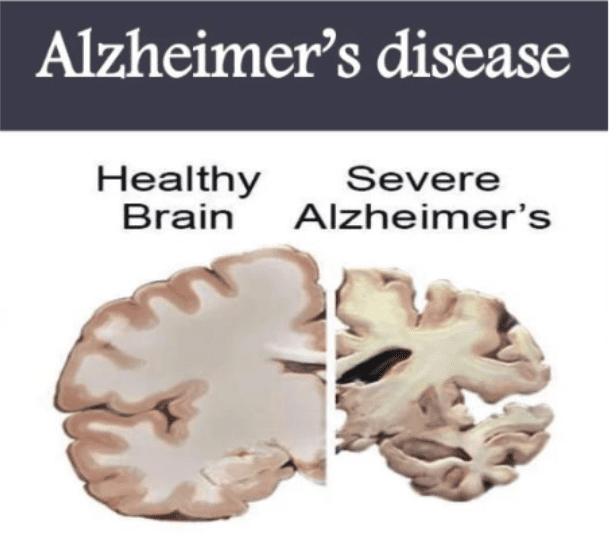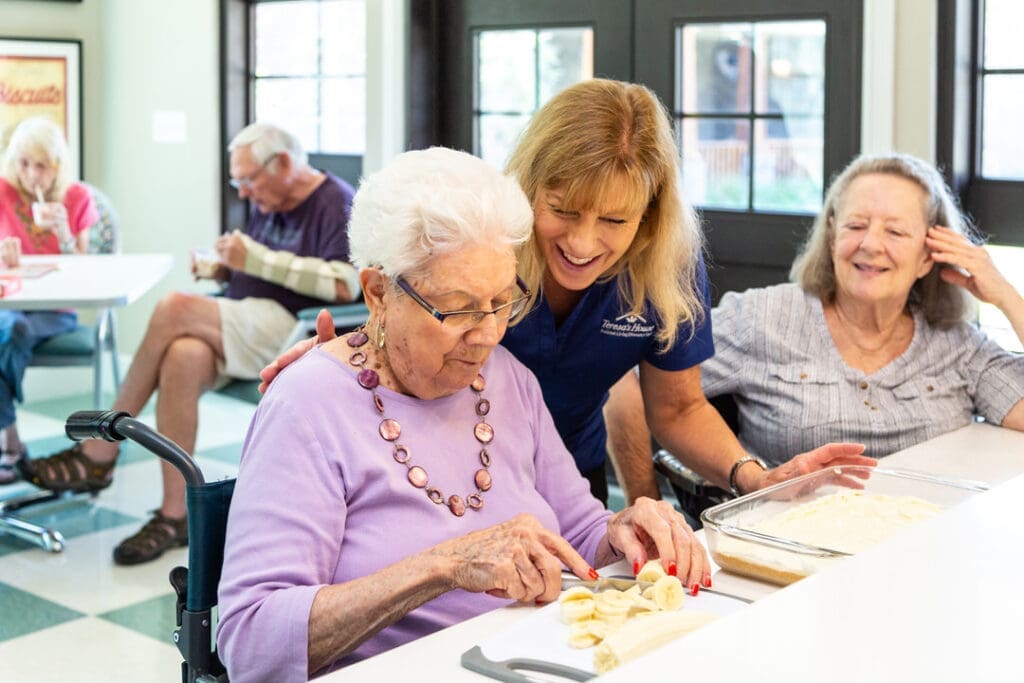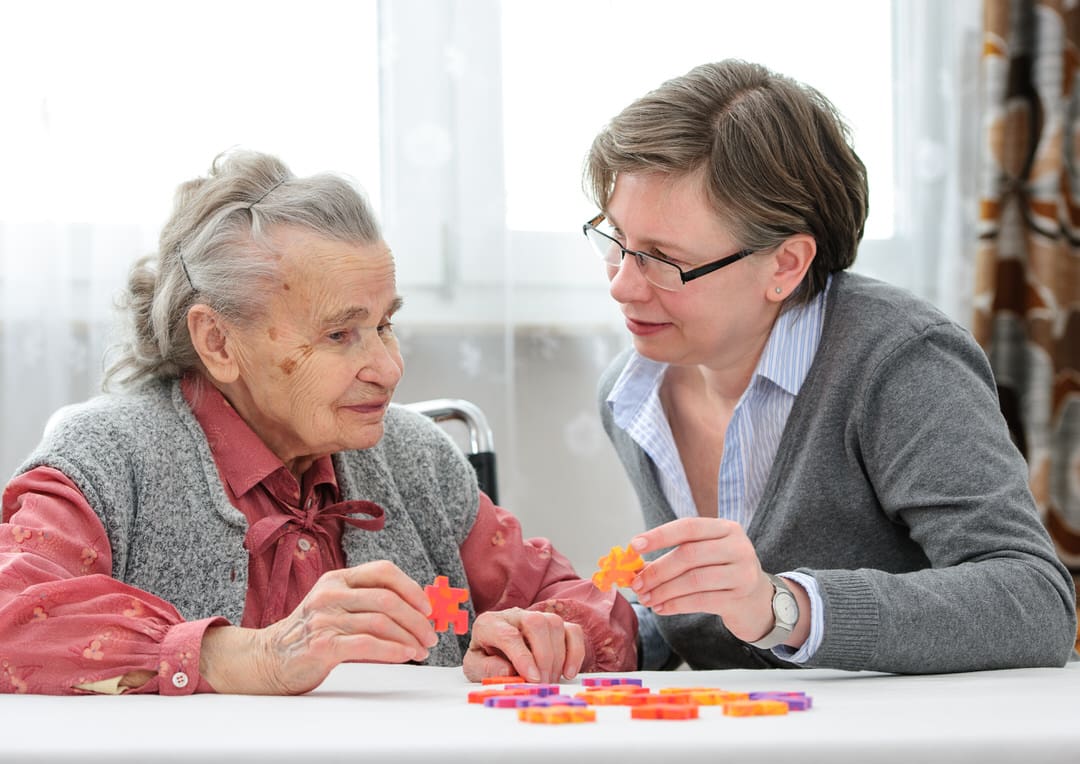The Irreversible Nature of Dementia and Its Profound Impact
In Part 1, we delved into the daunting statistics that illustrate the dramatic rise in dementia cases, with Alzheimer’s Disease taking the lead, followed by Lewy Body Dementia, Frontotemporal Lobe Dementia, and Vascular Dementia.
These statistics reflect the harsh reality that dementia entails the gradual deterioration of your loved one’s brain, resulting in damage that is, sadly, irreversible.
Visualizing Brain Atrophy
To truly grasp the gravity of dementia, let’s discuss brain atrophy, a term used to describe the shrinking of the brain as it deteriorates.
Picture a muscle that has atrophied due to disuse or injury; you understand that it won’t function properly, if at all.

Now, imagine a brain severely affected by Alzheimer’s Disease, and you’ll have a visual representation of the devastating impact on a person’s cognitive abilities.

You can clearly see the damage in the photo and can understand immediately that this person’s brain is severely compromised.
However, here’s the challenge: When we look at a person living with dementia, we can’t see their brain. We see their familiar face and hear their voice, which we’ve always known to be competent. We desperately want to believe they are still themselves, but sadly, they are not.
Often, a person with dementia maintains their social skills, and in some cases, specific parts of the brain function adequately.
But other parts deteriorate or die. In the most common forms of dementia, the entire brain’s atrophy is progressive and relentless, leading to the eventual end of life.
The Incurable Nature of Dementia
As noted in Part 1, true dementias are currently incurable, with no cure on the horizon.
While there are medications that can temporarily enhance brain function, they only offer a brief respite from the relentless progression of the disease.
So, what can we do for a loved one with dementia?
We love them, work to understand them, support them, and ensure they receive the care they need. That’s all we can do.
Our goal is to place them in environments and situations where they can be as successful as possible while preserving as much of their dignity as we can.
Understanding the Daily Struggles
Understanding the journey is crucial, though often incredibly challenging.
Let’s start by attempting to understand what individuals with dementia are experiencing.
Their brains are dying, and they are struggling.
Empathizing with Cognitive Challenges
Have you ever had a day when you felt “off,” not thinking clearly, as if you were in a fog?
Maybe you’ve experienced this after surgery, during chemotherapy, or after a concussion.
On such days, you wouldn’t want to tackle complex problems or make difficult decisions. You’d avoid noisy places and taxing activities.
It doesn’t sound pleasant, and yet, this is the daily reality for your loved one with dementia, and it only gets worse. It’s often referred to as “the long goodbye” and, in later stages, “the 36-hour day” as their needs become more demanding.
Dealing with Frustration
Another thing to consider is empathy. When you’re having a bad day, you hope those around you understand if you’re grumpy, and you don’t want them to get mad at you.
The same applies to your loved one with dementia, although it can be challenging for those around them because it’s frustrating.
The Heartbreak of Memory Loss
One of the most heartbreaking aspects of dementia is memory loss. Particularly with Alzheimer’s Disease, the ability to remember new things is quickly lost.
Their short-term memory is the first to be affected, followed by the gradual erosion of long-term memories.
The Analogy of a Fading Computer Memory
To illustrate, think of the brain of a person with Alzheimer’s Disease as a computer that can no longer save new files.
Existing files remain intact, but the ability to save new ones diminishes rapidly. Over time, files are deleted, starting with the most recent and progressing chronologically.
That’s Alzheimer’s—old memories generally remain intact, but recent ones disappear, and there’s no capacity to retain new memories for more than a few minutes (eventually seconds).
Patients may regress, believing they’re in a bygone era, thinking their parents are still alive, and sometimes even reverting to childlike behavior. Along the way, old traumas may resurface, presenting challenging behaviors.
Changing Behaviors and Challenges
In other forms of dementia, the impact on memory and the ability to remember new things depends on which part of the brain is damaged.
Unique Challenges of Different Dementia Types
For instance, individuals with Lewy Body dementia may interact well but believe in bizarre hallucinations as reality.
Their perceptions can be incredibly convincing, even though they are entirely unreal.
Supporting Your Loved One with Dementia
Each form of dementia comes with its own set of challenging behaviors.
Personalities can undergo radical changes. The most affable people can become irritable, and lifelong curmudgeons may turn charming. The changes often bear little resemblance to who they were.
As personalities shift, the internal filter that typically prevents inappropriate thoughts and actions from being expressed may fade away.
Providing a Supportive Environment
So, how do you help a loved one with dementia? The primary goal is to set them up for success.
Read about Teresa’s House philosophy and approach to memory care to find out how we prioritize the well-being and dignity of your loved ones.
Flexibility and Empathy are Key
How do you achieve that? First, recognize that it’s challenging, and what works today may not work tomorrow.
Flexibility is crucial as their needs evolve with the progression of the disease.
Avoiding Frustration and Anger
Try your hardest not to get angry with them. It’s normal to feel frustrated by their behaviors, and it’s essential to have someone you can vent to.
However, getting angry at someone with dementia, who doesn’t realize what they’ve done wrong and can’t control it, will only make them miserable.
Effective Communication Strategies
If your loved one has short-term memory deficits, avoid asking about current situations or events.
They will lose the ability to remember current events as the disease progresses, and yet they may still feel embarrassed about not knowing.
Simplifying Communication
Imagine the frustration and embarrassment of being asked about your day and having no idea.
It’s essential to avoid reminding them daily that they can’t remember. This stress can be overwhelming, and it can affect their well-being.
Encouraging Independence and Providing Choices
So ask your loved ones questions they can answer. Instead of asking about their day, inquire about their hometown, their childhood, or their first job.
Recognize that successful conversations will revolve around their interests and abilities.
You can also engage them with stories. It’s often easier for a person with dementia to listen than to participate actively in a conversation. Instead of saying, “Brooke was in a play,” say, “My daughter, Brooke, was in a play.”
This helps when names begin to fade from memory.
Share stories from the past, such as, “Hey, Dad, I was reminiscing about the trip we took when I was in grade school. Do you remember that time we went to Yellowstone in the station wagon?”
Reminiscing can bring joy and connection.
Read 4 more ways to practice reminiscence therapy.
Making Decision-Making Easier
Another challenge in caring for someone with dementia is allowing them to make choices while avoiding overwhelming them.
Rather than asking, “What do you want to eat?” you can say, “Would you prefer chicken or beef?”
Offering limited choices makes decision-making more manageable for them.
Preserving Dignity in Choices
This approach extends to other aspects of life. Instead of asking, “What do you want to wear?” say, “Would you prefer this outfit or this outfit?” or “Would you like to play cards or watch football?”
By simplifying choices, you empower your loved one to maintain a sense of control while minimizing confusion.
Effective Communication Strategies
Communication becomes increasingly challenging as dementia progresses. Your loved one’s ability to process and understand words diminishes over time.
To facilitate communication:
- Talk slowly, clearly, and rhythmically, using shorter and simpler words.
- Break tasks into simple, step-by-step instructions. For example, instead of saying, “Mom, get dressed and let’s go,” you can say, “Let’s go ahead and put your socks on. Great, now put your shoes on. Okay, now let’s head for the door,” and so on.
Approaching Emotional Moments with Empathy
Your loved one will likely experience moments of frustration or confusion. In these instances, empathy is your greatest ally.
Instead of getting angry or correcting them, offer understanding and support.
Say, “I am so sorry that happened,” or “I know this is hard, and I am so sorry.”
Encouraging Engagement and Independence
Focusing on the present and involving them in tasks they can still manage becomes increasingly important as dementia progresses.
Simple activities like folding clothes, washing dishes, setting tables, or cleaning can provide them with a sense of accomplishment.
A Dementia Care Strategy
As dementia presents new challenges each day, it’s crucial to remain flexible and patient.
What works today might not work tomorrow, next week, or next month.
Understanding their perspective and emotions is key to providing the best care.
Conclusion
Dementia is indeed a challenging journey, and understanding its complexities is the first step toward providing the best care for your loved one.
In Part 3 of “Understanding Dementia & Assisted Living/Memory Care Options – What You Need to Know,” we will explore even more in-depth insights into care options, available resources, and additional ways to support both individuals with dementia and their families.
Remember that patience, love, and understanding are your most valuable tools when caring for someone with dementia.
Every day may present new challenges, but your unwavering support can make a world of difference in their journey.
We invite you to experience why Teresa’s House is a truly exceptional and caring place, dedicated to our residents and providing peace of mind for their families.
Schedule a tour of Teresa’s House today to find the perfect home for your loved one.


